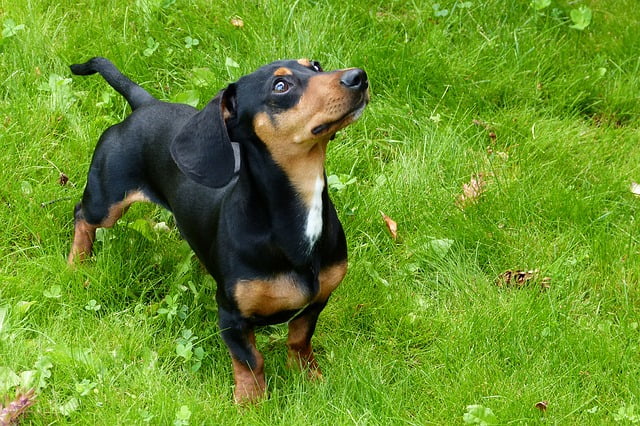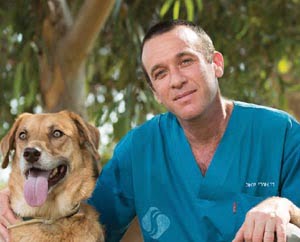Man’s best friend is known for its keen sense of smell and for centuries, dogs have assisted humans in sniffing out scents that the human nose simply cannot pick up. Now, an Israeli researcher has found that the canine sense of smell has another, extremely useful ability – sniffing out cancerous cells.
Dr. Uri Yoel, M.D., a 43-year-old specialist in internal medicine and instructor at Ben Gurion University‘s Faculty of Health Sciences, conducts research on the ability of dogs to smell cancer. He recently concluded that dogs can differentiate between the scents of cancerous cells and non-cancerous cells.
Related articles
- Early Diagnosis Of Cancers Saves Lives At Tel Aviv Hospital
- Israeli Technology Turns Tumors Into Ice Balls To Cure Cancer
The idea was first formed in the mind of a friend of Dr. Yoel’s advisor, Professor Pesach Shvartzman. Shvartzman’s friend, a dog trainer, was keen on researching whether his dogs’ skill-sets could be expanded to include detecting cancers, and go beyond the usual explosives and drugs sniffs.
To test this theory, Yoel volunteered to conduct a study. He taught two dogs to identify the smell of cancerous cells from malignant breast cancer in cultures and to differentiate them from non-cancerous cell cultures. Next, the dogs were put to the test and were able to successfully pick out the cancerous cell culture plate, which was located between four other non-cancerous cell culture plates.
“In the case of lung cancer or melanoma this did not come as a great surprise, as it made sense that the cancer could be smelled on the patient’s breath or skin,” says Yoel. “Regarding other forms of the disease, like breast cancer, it was less evident. All smells leave a molecular footprint, but with something like breast cancer it was hard to understand how this worked.”
Despite the promising results, the test had not yet concluded whether it is the actual cancer that the dogs can smell. It was possible, Yoel reasoned, that the dogs smelled the human body’s reaction to the disease, in the form of an inflammation or necrosis. So Yoel did further research.
One smell for all forms of cancer?
“We checked this with in vitro cell cultures of breast and lung cancer and melanoma. It was logical that if the dogs respond to cell cultures, they are reacting to the smell of the cancer itself,” Yoel explains. “The dogs were taught to smell only breast cancer cell cultures but were tested also for their ability to recognize lung cancer and melanoma cell cultures. They scored a perfect 100 percent in all cases.”
Sign up for our free weekly newsletter
Subscribe“Our research proves that dogs can smell cancer cells in vitro (cells ouside the human body), and that different types of cancer share the same smell print,” says Yoel. “Again, we cannot know for sure if in vivo (cells inside the human body), the dogs are reacting to the cancer itself or to the body’s reaction to it. I think that the cancer itself has a special smell print that the animals detect, though it may be a combination of the two factors.”
Yoel’s study is not the first indicator that dogs can somehow detect cancer. Ten years ago, an article was published in a medical journal, which detailed the story of a woman who found out she had melanoma after her dog barked repeatedly at a specific part of her body, where a tumor was later found. According to Ben Gurion University, after that article was published, many other people reported similar stories.
Securing funding to further the research
Yoel’s next plan is to test the dogs as a means of detecting lung cancer. He plans to expose them to hundreds of smokers and see if they can detect early-stage cancer in any of them. For now, the only impediment for further research is funding, as so the research was conducted on a voluntary basis. To continue with his study, Yoel will have to hire two dog trainers; secure a place to conduct the tests and keep two additional dogs as backup for the his current canine helpers.
“Even before we start training the dogs, we must see if they are suitable for this type of work,” he says. “We need to see the dogs’ qualities as puppies and to trace their development. All this takes time – and modest resources.”
A volunteer through and through
Yoel’s volunteer spirit is not only present in his professional life. Aside from his day job as an internist at Soroka University Medical Center, he and his family live in Kfar Rafael, a community for mentally disabled adults. The Yoels share their home with six adults with mental disabilities.
“I became an internist because it combines connection with people, the thought process of diagnosis, research and intensive care,” says Yoel. “And living at Kfar Rafael, you devote ‘more than a little’ time to others. This has made for a life filled with meaning.”
Related posts

Israeli Medical Technologies That Could Change The World

Harnessing Our Own Bodies For Side Effect-Free Weight Loss

Missing Protein Could Unlock Treatment For Aggressive Lung Cancer





Facebook comments